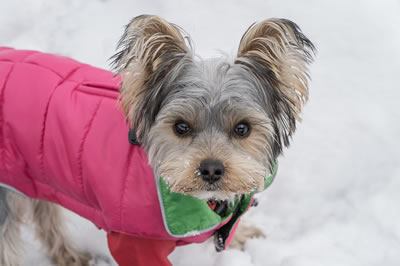Guest Blogger: Bernie Boxer
Winter brings special challenges to dog owners. When temperatures drop and freezing weather moves in, you’ll need to take extra measures to ensure your dog is safe and comfortable. Here are some tips for managing hazards the season brings.
Winter wellness. Chilly weather can aggravate certain medical conditions such as arthritis. If your dog hasn’t seen your veterinarian prior to winter, it’s important to make an appointment for an exam. What’s more, as the American Veterinary Medical Association points out, dogs who are in top physical condition fare best facing winter weather.
Know your pooch. Every dog is different, and just like people some mind the cold more than others. There are physical factors that can affect how well your dog tolerates colder conditions, such as body fat stores and coat length. Age and medical conditions can also weigh into your dog’s comfort during winter. Bear all this in mind and make choices based on your dog’s personal comfort zone. For example, dogs with shorter coats or who tend to get chilly benefit from a sweater or jacket when they go outside to potty.
Winter hazards. Winter brings on a host of potential dangers. Keep in mind these tips for maintaining Fido’s safety:
- Provide shelter for your dog to escape the elements. It should be warm, dry, and include bedding such as a blanket and pet bed.
- Understand that cats and dogs have higher resting body temperatures and need a blanket in their beds during colder months, even inside.
- If your dog gets wet from rain or snow, some experts recommend toweling or blowing dry the coat. Also clean and dry your dog’s paws, paying attention to the areas between the toe pads. A layer of petroleum jelly on paw pads can help keep them getting dry and cracked, too.
- If your dog has a long coat, Cesar’s Way suggests trimming the hair between the toes with a man’s beard trimmer to prevent ice from building up.
- It takes more energy to stay warm in colder temperatures. Some professionals note that dogs kept outside for any extended periods of time will require a significant increase in caloric intake.
- Dogs cannot stay hydrated by consuming snow. Your dog will require access to plenty of fresh water at all times, even in winter months.
- If your dog experiences dry skin during winter, one suggestion is to increase brushing and combing. Reduce the frequency of bathing and use only gentle dog shampoos and conditioners.
- Cold cars are a risk to your dog’s safety since temperatures can plummet too low, and leaving the engine running means risking carbon monoxide poisoning. When it’s very cold, leave your dog at home.
- Alcohol and chocolate are poisonous to dogs, even in small quantities. Make sure you store them safely out of reach.
- Antifreeze is a deadly poison and smells sweet, so dogs may dabble if they find it lurking in the driveway or garage. Make sure any spills or leaks are cleaned up thoroughly.
- Beware of supplemental heat sources like fireplaces and space heaters, as they can severely burn your dog.
Your senior pup. Elderly dogs often require a little extra TLC. As explained by Redfin, your aging pooch can experience more trouble regulating body temperature. Adjusting your thermostat up to around 78 or 80 degrees may be necessary to keep your old friend comfortable. Provide plenty of bedding, and be sure to dress your dog for trips outside, since extreme temperature variations can increase health risks.
Winter protection is vital. Your dog is part of the family, and as a responsible pet owner you want to provide for your pooch throughout the changing seasons. When temperatures drop and weather is disagreeable be sure to take proper precautions. Keep your furry family member safe and sound.

